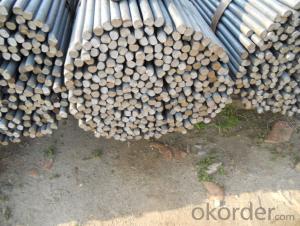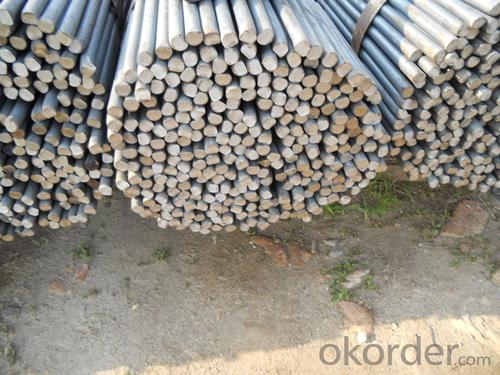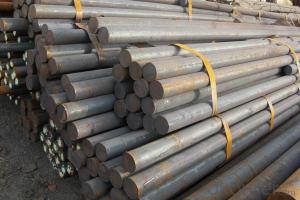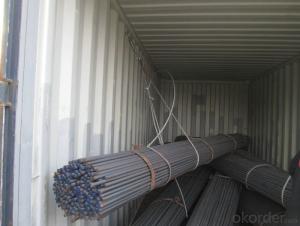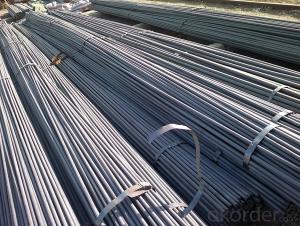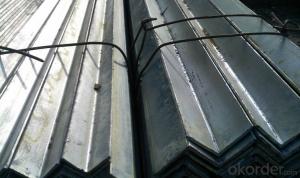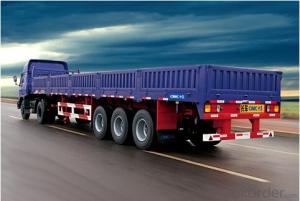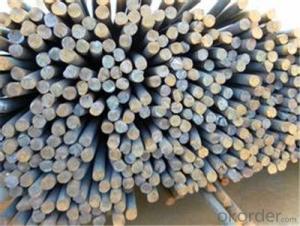Round Steel with Good Quality and Competitive Prices for Sale
- Loading Port:
- China main port
- Payment Terms:
- TT OR LC
- Min Order Qty:
- 100 m.t.
- Supply Capability:
- 2000 m.t./month
OKorder Service Pledge
OKorder Financial Service
You Might Also Like
Specification
Product Description:
OKorder is offering Round Steel with Good Quality and Competitive Prices for Sale at great prices with worldwide shipping. Our supplier is a world-class manufacturer of steel, with our products utilized the world over. OKorder annually supplies products to European, North American and Asian markets. We provide quotations within 24 hours of receiving an inquiry and guarantee competitive prices.
Product Applications:
Round Steel with Good Quality and Competitive Prices for Sale are ideal for structural applications and are widely used in the construction of buildings and bridges, and the manufacturing, petrochemical, and transportation industries.
Product Advantages:
OKorder's Round Steel with Good Quality and Competitive Prices for Sale are durable, strong, and resist corrosion.
Main Product Features:
· Premium quality
· Prompt delivery & seaworthy packing (30 days after receiving deposit)
· Corrosion resistance
· Can be recycled and reused
· Mill test certification
· Professional Service
· Competitive pricing
Packaging Details:
Products are packed in bundle and then shipped by container or bulk vessel, deformed bar is usually naked strapping delivery, when storing, please pay attention to moisture proof. The performance of rust will produce adverse effect.
Each bundle weight: 2-3MT, or as required
Payment term: TT or L/C
Delivery Detail: within 45 days after received advanced payment or LC.
Label: to be specified by customer, generally, each bundle has 1-2 labels
Trade terms: FOB, CFR, CIF
FAQ:
Q1: How do we guarantee the quality of our products?
A1: We have established an advanced quality management system which conducts strict quality tests at every step, from raw materials to the final product. At the same time, we provide extensive follow-up service assurances as required.
Q2: How soon can we receive the product after purchase?
A2: Within three days of placing an order, we will begin production. The specific shipping date is dependent upon international and government factors, but is typically 7 to 10 workday.
Q3: Why buy Materials & Equipment from OKorder.com?
A3: All products offered by OKorder.com are carefully selected from China's most reliable manufacturing enterprises. Through its ISO certifications, OKorder.com adheres to the highest standards and a commitment to supply chain safety and customer satisfaction.
Images:
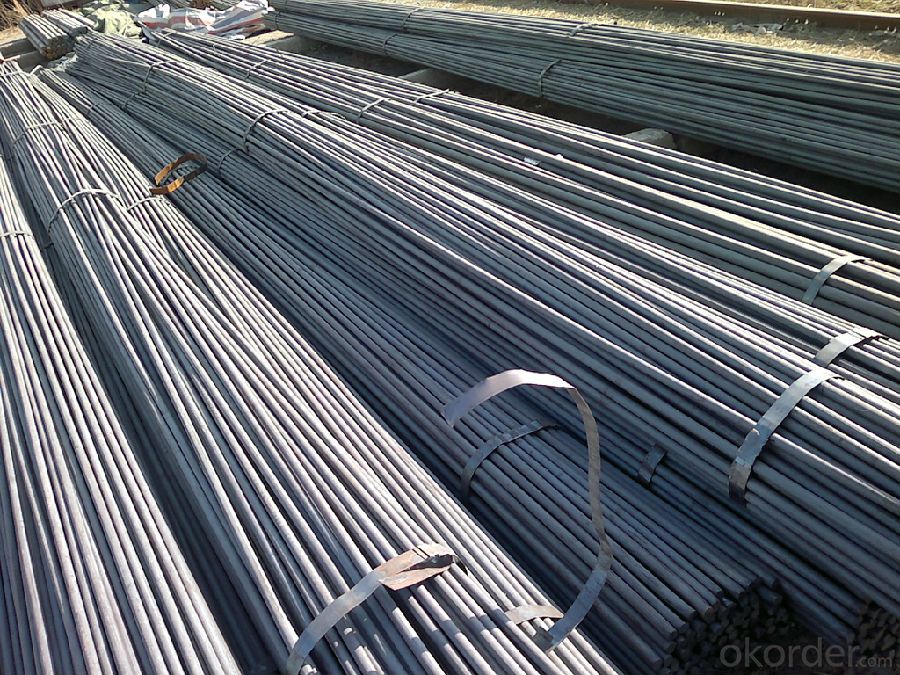
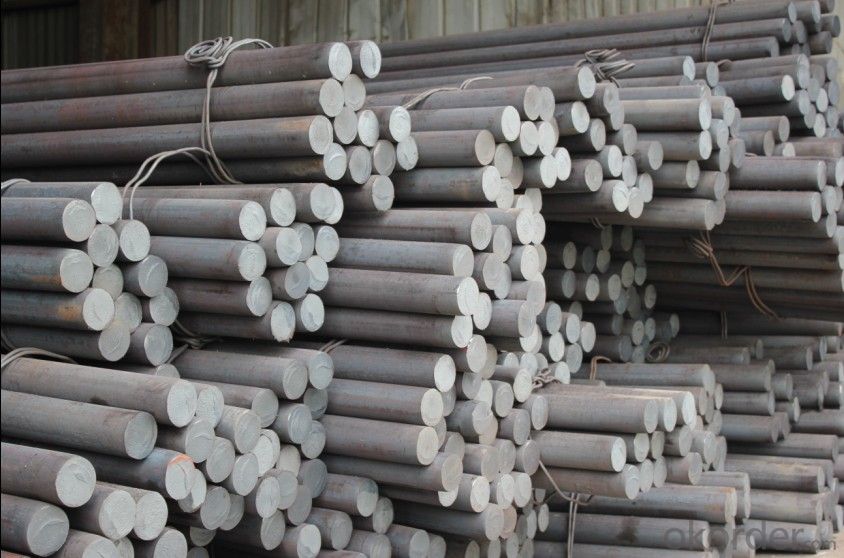
- Q: Can steel round bars be used for pump shaft applications?
- Yes, steel round bars can be used for pump shaft applications. Steel round bars are commonly used for pump shafts due to their excellent strength, durability, and resistance to corrosion. Pump shafts are subjected to high torsional loads and need to withstand the stresses of rotating machinery. Steel round bars offer the necessary mechanical properties to handle these conditions, making them a suitable choice for pump shaft applications. Additionally, the versatility of steel allows for various heat treatments and surface finishes to further enhance its performance and longevity in pump shafts.
- Q: How to determine the welding seam height of steel plate and steel bar?
- If the end of the vertical plane and the steel plate welding, welding angle as the bar diameter and the general welding height is 0.7 times the diameter of the arc can be reinforced; if the length direction of the surface of steel plate and steel welding, 2 side fillet weld cracks in the welded steel plate and steel between the full and round steel weldment the maximum diameter of arc phase can be flat.
- Q: Can steel round bars be used in the manufacturing of architectural features?
- Yes, steel round bars can certainly be used in the manufacturing of architectural features. Steel is a versatile and durable material that can be shaped and formed into various architectural elements such as columns, beams, handrails, and decorative features. Its strength and resistance to corrosion make it suitable for both structural and decorative purposes in the construction of buildings and other architectural designs.
- Q: Are steel round bars available in custom lengths?
- Yes, steel round bars are available in custom lengths.
- Q: What are the advantages of using tungsten-alloy steel round bars?
- Tungsten-alloy steel round bars offer several advantages over other materials, making them a popular choice in various industries. Firstly, tungsten-alloy steel round bars have exceptional strength and durability. The addition of tungsten to the steel composition significantly improves its hardness and toughness, making it highly resistant to wear, deformation, and fatigue. This enhanced strength ensures that tungsten-alloy steel round bars can withstand heavy loads and high-pressure applications, making them ideal for use in industries such as aerospace, automotive, and construction. Another advantage of using tungsten-alloy steel round bars is their excellent heat resistance. Tungsten has one of the highest melting points among all elements, making it highly suitable for applications that involve extreme temperatures, such as furnace parts, cutting tools, and high-speed machinery. The heat resistance of tungsten-alloy steel round bars allows them to maintain their structural integrity and performance even in demanding environments, minimizing the risk of deformation or failure. Furthermore, tungsten-alloy steel round bars have superior corrosion resistance. The addition of tungsten to the steel alloy forms a protective oxide layer on the surface, which acts as a barrier against corrosive elements, moisture, and chemicals. This corrosion resistance makes tungsten-alloy steel round bars ideal for applications in marine environments, chemical processing plants, and oil and gas industries, where exposure to corrosive substances is common. Additionally, tungsten-alloy steel round bars provide excellent machinability. The hardness and toughness of these bars make them easy to shape, cut, and drill, allowing for precise machining and tight tolerances. This machinability makes tungsten-alloy steel round bars suitable for manufacturing intricate components and parts that require high precision and accuracy. Lastly, tungsten-alloy steel round bars have a high density, which gives them unique properties such as improved radiation shielding capabilities. This makes them valuable in industries where radiation protection is crucial, such as nuclear power plants, medical equipment, and aerospace applications. In conclusion, the advantages of using tungsten-alloy steel round bars include exceptional strength and durability, excellent heat resistance, superior corrosion resistance, excellent machinability, and high density for radiation shielding. These advantages make tungsten-alloy steel round bars a reliable and versatile choice for various industries, ensuring optimal performance and longevity in challenging environments.
- Q: What are the different grades of carbon steel round bars for structural applications?
- Structural applications offer a variety of grades for carbon steel round bars, each possessing unique properties and characteristics. Some commonly used grades are as follows: 1. ASTM A36: Widely utilized for structural projects, this grade of carbon steel round bars boasts exceptional weldability and machinability. 2. ASTM A572-50: This high-strength, low-alloy structural steel grade provides an improved strength-to-weight ratio compared to traditional carbon steel. It is often employed in construction and structural applications requiring high strength. 3. ASTM A588: Primarily utilized in corrosion-resistant applications, this high-strength, low-alloy structural steel grade demonstrates excellent atmospheric corrosion resistance. It finds frequent usage in outdoor structures like bridges and buildings. 4. ASTM A709: Commonly employed in bridge construction, this high-strength, low-alloy structural steel grade offers outstanding strength, weldability, and toughness, making it ideal for demanding structural applications. 5. ASTM A105: This low-carbon steel grade possesses good strength and impact resistance, making it suitable for applications necessitating high strength and ductility, such as heavy equipment and machinery construction. These examples represent a limited selection of carbon steel round bar grades available for structural applications. The selection of an appropriate grade depends on factors including desired strength, weldability, machinability, and corrosion resistance. It is advisable to consult with a steel supplier or engineer to determine the most suitable grade for a specific application.
- Q: What are the cost considerations for steel round bars?
- The cost of steel round bars can vary depending on several factors. Firstly, the cost can be greatly influenced by the type and grade of steel used in production. Different types of steel, such as carbon steel, alloy steel, or stainless steel, have varying costs due to differences in their composition and properties. Higher grade steel, which offers superior strength and durability, tends to be more expensive compared to lower grade options. Secondly, the cost is affected by the size and dimensions of the round bars. Larger diameter and length of the bars require more raw material and additional processing, resulting in higher costs. Moreover, specialized shapes or custom sizes may necessitate extra manufacturing steps or tooling, which can increase the overall price. The quantity or volume of round bars ordered can also impact the cost. Bulk orders typically benefit from economies of scale, leading to reduced unit costs. Additionally, longer-term contracts or partnerships with suppliers can result in better pricing agreements. It is important to consider transportation and logistics expenses as well. The cost of shipping steel round bars can vary based on factors such as distance, mode of transportation, and handling requirements. International shipping, for example, may involve additional customs duties and taxes. Lastly, market conditions and fluctuations in the steel industry can have an impact on the cost of round bars. Factors like supply and demand, raw material costs, and currency exchange rates can all influence the final price. It is crucial to stay updated with market trends and work closely with suppliers to negotiate favorable pricing. To ensure that the cost of steel round bars aligns with your budget and meets your specific requirements, it is essential to conduct thorough research, compare quotes from multiple suppliers, and evaluate the quality-to-price ratio before making a decision.
- Q: What are the weight calculations for steel round bars?
- The weight calculations for steel round bars depend on the diameter and length of the bar. The formula used to calculate the weight is weight = volume × density, where volume = π × (diameter/2)² × length and density = 7.85 g/cm³.
- Q: What are the different types of carbon steel round bars?
- There are several different types of carbon steel round bars, including low carbon steel, medium carbon steel, and high carbon steel. Each type has varying levels of carbon content, which determines its strength and hardness. Low carbon steel round bars have the lowest carbon content and are more easily welded and formed. Medium carbon steel round bars have a higher carbon content and are stronger and more durable, making them suitable for applications that require higher strength. High carbon steel round bars have the highest carbon content and are extremely strong and hard, making them ideal for applications that require maximum strength and wear resistance.
- Q: What are the environmental impacts of steel round bar production?
- The production of steel round bars has a range of environmental consequences. Firstly, the extraction of raw materials, like iron ore and coal, necessary for steel production, results in habitat destruction, deforestation, and disruption of ecosystems. Mining activities also produce substantial amounts of waste, including tailings and waste rock, which can contaminate soil, bodies of water, and the air. Converting iron ore into steel requires significant energy consumption, primarily derived from fossil fuels. The burning of these fuels releases greenhouse gases, such as carbon dioxide and nitrogen oxides, contributing to climate change and air pollution. Furthermore, steel production emits particulate matter, sulfur dioxide, and other pollutants that can have adverse effects on human health and ecosystems. The manufacturing of steel also demands substantial water usage for cooling, cleaning, and processing. Without proper water management practices, this can lead to water scarcity and pollution. Discharging untreated or inadequately treated wastewater from steel production can contaminate nearby water sources, impacting aquatic life and potentially harming human populations that rely on these bodies of water. Additionally, the transportation of raw materials and finished steel products over long distances contributes to carbon emissions and air pollution. The energy-intensive nature of steel production and transportation further amplifies the overall environmental impacts of the industry. To mitigate these environmental impacts, the steel industry has implemented various measures. These include adopting more efficient technologies, such as recycling and waste reduction, enhancing energy efficiency, and implementing cleaner production processes. Furthermore, the industry has been prioritizing the reduction of its carbon footprint by increasing the utilization of renewable energy sources and implementing carbon capture and storage technologies. Overall, while the production of steel round bars has negative environmental implications, ongoing efforts within the industry aim to minimize these impacts and transition towards more sustainable practices.
Send your message to us
Round Steel with Good Quality and Competitive Prices for Sale
- Loading Port:
- China main port
- Payment Terms:
- TT OR LC
- Min Order Qty:
- 100 m.t.
- Supply Capability:
- 2000 m.t./month
OKorder Service Pledge
OKorder Financial Service
Similar products
Hot products
Hot Searches
Related keywords
